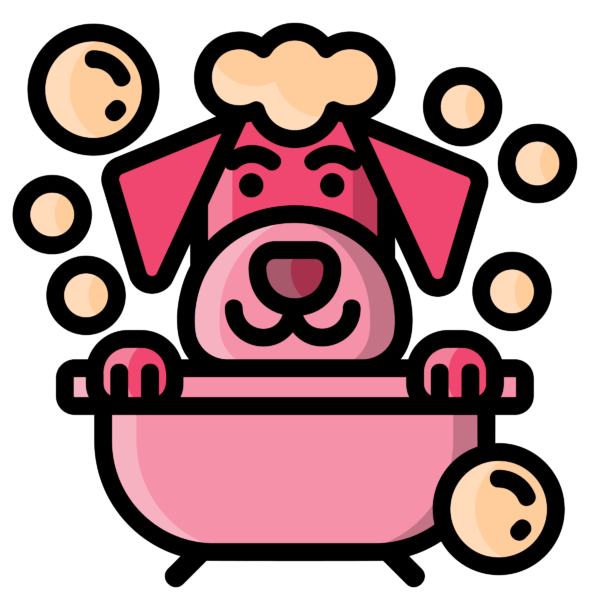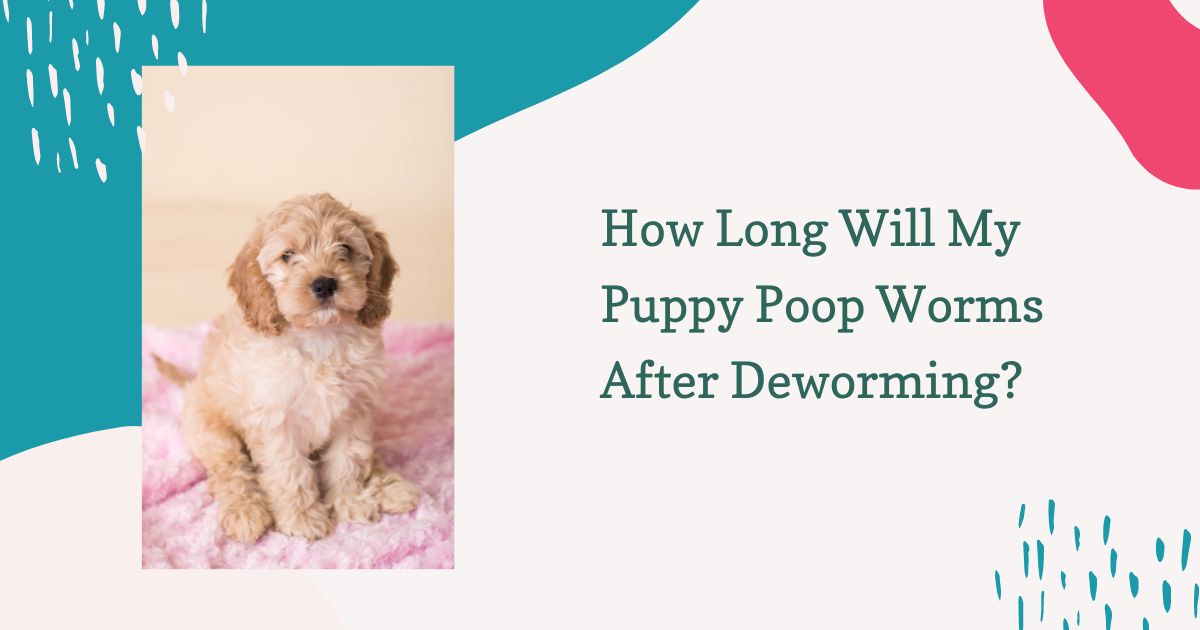How long will my puppy poop worms after deworming? Many people have this question, and we’re here to help. Puppies are constantly getting sick because they’re so vulnerable to parasites. That’s why it’s so important to deworm them regularly.
Keep reading to find out how long your puppy will take to eliminate all those pesky worms.

The Importance of Deworming Puppies?
Worm medicine for puppies is so critical. Getting your pup dewormed regularly would be best to keep them healthy and worm-free. This will help prevent worm infestations from happening in the first place, as well as treat any existing worm infestations.
Can Worms Kill a Dog?
Unfortunately, yes. Worms can be deadly for puppies and dogs if left untreated. They can cause severe health issues like anemia and intestinal blockages, leading to death. Getting your pup dewormed regularly is essential, so you don’t have to worry about worm-related complications.
How Long Does Dewormer Take to Work?
So, how long does worm medicine for puppies take to work? Depending on the type of dewormer you purchase, it will take between two and six hours for the medication to start working.
Once the worm medicine for puppies has started working, you’ll notice that your pup is much less itchy and uncomfortable. Some dewormers dissolve the worms, while others paralyze them.
Once the medicine paralyzes the worms, your puppy will poop them out. This is perfectly natural. It may take up to three days for all the worms to leave their system. This means you must keep an eye on them to ensure they don’t have any adverse reactions.
How Long Will My Puppy Poop Worms After Deworming?
Generally, puppies will expel worms in their stool for a week following deworming treatment. It may take up to two weeks to stop observing worms entirely in atypical instances. If the puppy worm treatment is effective, your puppy should excrete dead worms in their feces. Dead worms are darker and more transparent than those that are living.
If you continue to see dead worms in dog poop after two weeks, you should contact your vet. Likely, the dewormer wasn’t effective, and you may need to give your pup a different medication.
What Else to Expect After Deworming a Puppy
You have many choices to help you treat and control worms in your dog; the most frequent are tablets and spot-on treatments. Once you find the best product for your dog, administering is usually simple. But what occurs after you’ve treated your dog for worms? This is what to expect in deworming’s initial hours and days.
What to Expect After Deworming a Puppy During the First Few Hours
Deworming your dog is a painless process, similar to feeding your pet a treat. If you use tablet-based deworming treatment, hiding the pill in food will help ensure that your dog swallows it completely.
Try using cheese, peanut butter, turkey, or wet food. Although some tablets come in flavors that taste like a treat to your pet, you may still need to disguise the pill in food. Even if the tablet is flavored, some dogs may try to spit it out immediately or several minutes after you give it to them. Disguising the pill as a treat can make the process easier for you and your dog.
Some dogs might vomit after taking this oral medication. If your pet is a puppy or tends to eat too quickly and then get sick, watch them for vomiting for two to three hours after you give them the deworming tablet.
If your dog throws up the whole tablet, wait a bit for them to calm down, and then give them the pill again.
Your dog will usually return to normal within a few hours after the deworming product you use takes effect.
What Happens After a Few Days of Deworming?
After your puppy takes a deworming treatment, you might see worms in their stool within a few days.
It all depends on the type of worm they have. Most deworming products fight against roundworms, hookworms, and whipworms by paralyzing and then killing the parasites; tapeworms are killed and split into smaller pieces. Some intestinal worms, like hookworms and whipworms, are so small that you won’t be able to see them in your dog’s stool.
While it may not be the most appealing image, finding puppy worms in poop after deworming is perfectly normal. It’s a good sign that the medicine is working and the worms are no longer living inside your dog!
Occasionally, you may see a dead worm in puppy poop after deworming, or it may have diarrhea following treatment. Although it may be unsettling to observe, all are typically normal with recently dewormed dogs.
Generally, when you deworm your puppy, it may experience a range of side effects. Usually, these are mild and should pass within a few days. However, it’s important to contact your vet if your pup displays vomiting, diarrhea, or lethargy for more than a few days after deworming.
Worm Types That Affect Puppies
Different worms can affect a puppy’s digestive tract: roundworms, tapeworms, hookworms, heartworms, ringworms, coccidia, and whipworms.
Roundworms
Toxocara canis (T.canis) and Toxascaris leonina are the two types of roundworms that infect dogs, but out of the two, T. canis is much more common in puppies–and they’re able to transmit it to humans too.
Puppies may contract roundworms through their mother’s milk or while in utero. Furthermore, puppies will become infected if they consume roundworm eggs from dirt, other dogs, dead animals, or feces.
Roundworms are often said to look like spaghetti that moves because of their long, slender shape. They can reach a few inches in length and have white, round, and smooth eggs.
Ringworms
Ringworm appears as oval patches on your puppy’s skin with no hair. To prevent the disease, avoid contact with other dogs whenever possible. If you think your puppy might have ringworm, take them to the vet immediately.
You can only see ringworm under ultraviolet light, but your veterinarian will know how to treat it once detected.
Heartworms
Heartworm is transmitted to puppies via mosquito bites and can cause damage to the heart or lungs, as well as coughing, lethargy, and fatigue. In severe cases, heartworm may be fatal. Your vet can detect these worms through a blood test; however, they are much easier to prevent than cure.
Tapeworms
The most common type of tapeworm that affects puppies is Dipylidium caninum. Puppies become infected by ingesting fleas that carry tapeworm larvae. Mothers can also pass tapeworms to puppies. If not treated, tapeworms can cause stunted growth and other health complications in puppies.
Tapeworms are elongated, flattened creatures with divided bodies. They can reach up to a foot long in dogs. They are commonly the first indication your dog has tapeworms.
Whipworms
Whipworms are tiny worms, measuring only a quarter of an inch in length. Dogs contract them by coming into contact with infected feces or other contaminated substances. Whipworm eggs are sturdy, as they can survive on surfaces for years!
Whipworm eggs are so small that it is almost impossible to tell if a surface has them. The most common sign of having whipworms is diarrhea, which lasts for a long time and feeling tired all the time, and stomach pain.
Hookworms
The name ‘hookworm’ comes from their minute, hook-shaped mouths. They are so tiny that they can often go unnoticed, but they consume a lot of blood in the intestine, leading to anemia.
Hookworm is dangerous to puppies and can be contracted through their mother’s milk or while in the womb. The most common symptoms of hookworm include abdominal pain, lethargy, and anemia in severe cases.
Coccidia
Puppies from puppy mills and pet stores tend to have coccidia worms. These parasites rarely affect adult dogs, so they are mostly a problem for puppies. The most common symptoms of coccidia are dehydration and bloody diarrhea.
If your puppy exhibits any of these symptoms, it’s essential to take them to the vet and get a proper diagnosis. They can then recommend the appropriate treatment to combat these parasites.
How Often to Deworm a Puppy
If you adopted your puppy from a responsible breeder or rescue, they would have already received their first deworming treatment. However, it is always best to ask the breeder when they had the treatment done so that you are aware of the date. Moreover, most veterinarians recommend getting this information from the breeder.
Deworm your puppy every four weeks, starting from their first deworming, and continue this routine until they reach at least four months old. Younger puppies are more susceptible to worm infections and may have three or four different ones in the first few months of life.
It would help if you reduced deworming treatments to twice a year once your puppy reaches four months old, as the vet recommended. Reducing deworming treatments helps prevent adult dogs from experiencing worm-related pain and discomfort.

How do Puppies Get Worms in the First Place?
Although they are adorable, puppies also have a lot of curiosity. This means there are plenty of ways your puppy can become infected with worms if you’re not careful.
Transmission From Mother to Puppy
It’s not unusual for mothers to transmit worms to their puppies. For example, parasites like roundworms infect puppies while still in the womb. Puppies can also get worms through their mother’s milk. If a nursing puppy’s mother has worms, the puppy will likely contract worms.
Ingesting Worm Eggs or Worm Larvae
Since puppies explore the world around them mostly with their mouth, they ingest a lot of dirt. This carries the risk of contracting worms, as grass, soil, and debris may all contain worm eggs or larvae.
When an infected animal defecates, it leaves parasite eggs on various surfaces that can harm puppies if ingested. If your puppy comes into contact with these surfaces, it may unknowingly eat worm larvae or eggs and become infected.
Transmission From Other Animals
Multiple pets in one household increase the risk of parasites spreading from one animal to another. To prevent this, make sure you deworm all your animals regularly.
Puppies can easily become infected with worms by coming into contact with contaminated feces, food, or surfaces. To prevent your pup from getting sick, it is vital to keep them away from the waste of other animals.
Fleas
If your puppy has fleas, they are at a higher risk of getting worms. This is because fleas can carry the larvae of worms. To protect your puppy from fleas, have a regular grooming schedule and be on the lookout for signs of these pests.
Fur
Although puppies enjoy grooming themselves, they may unwittingly swallow parasite eggs while licking their fur. Since your puppy will explore and play in many different environments, it will likely get dirty. Keeping them clean and bathed can prevent them from carrying worm eggs or larvae on their fur.
Signs That Your Puppy Has Worms
Even if you have taken all the necessary precautions, it is still possible for your puppy to get worms. If not treated early, these parasites can cause serious health problems. To prevent this from happening, it is essential to look out for common signs that your puppy has worms:
Bloating
Puppies with worms often show bloating symptoms, particularly nursing puppies that caught parasites from their mother.
Weight Loss
If your puppy’s growth stalls or unexpectedly begins to lose weight, it could signify a parasitic infection. Be sure to have them checked for worms if you notice either of these symptoms.
When parasites invade your pup’s digestive system, they block their ability to absorb nutrients. This eventually leads to weight loss.
Worms in Your Puppy’s Poop
You’ll know your puppy has worms when you start seeing them in its poop. If too many parasites exist in the intestines, your pup will pass some during bowel movements.
If your puppy has worms, it may vomit or pass them in its stool. Seeing parasites in your pet’s vomit or poop is one way to tell if they have an infection, though some types of the worm are too tiny to see without a microscope.
Diarrhea and Vomiting
As parasites feed off your puppy’s food, they can cause diarrhea and vomiting. If your pup is experiencing either of these symptoms, it is crucial to seek veterinary care as soon as possible.
Anemia
Parasitic infestations can cause anemia in puppies, a condition lacking red blood cells. This can lead to your pup feeling lethargic and weak, so if you notice any signs of anemia, it is important to check them for worms immediately.
Lethargy and Weakness
If your puppy is exhausted and listless, it may have worms, and you should have it checked by a vet.
Increased Appetite Without Weight Gain
If your puppy increases its appetite without gaining weight, it may have worms. This is because the parasites are leeching nutrients before they reach their digestive system.
Dull Coat
A dull and lifeless coat indicates that your pup may have parasites. Worms sap essential nutrients from their host, leading to a dull and lackluster appearance.
Pot-bellied Appearance or Swollen Abdomen
A pot-bellied appearance or a swollen abdomen is another common symptom of worms. If you notice these signs, it is best to seek veterinary care as soon as possible.
Coughing
Your puppy may also experience coughing and difficulty breathing if it has worms. This is because the parasites can migrate to the lungs, leading to respiratory issues.
Itching Around the Anus or Genitals
Puppies with worms often display signs of itching around their anus or genitals. The parasites irritate the skin, causing your pup to scratch and bite at themselves.
If your puppy shows any of these signs, it is vital to take them to your vet for a thorough check-up. A fecal exam will allow the vet to diagnose a worm infestation and administer the necessary treatment.
Preventing Puppy Worms
The best way to keep your puppy happy and healthy is to prevent worm infestation in the first place. You can do this by regularly deworming your pet and ensuring you feed them a balanced diet.
You will notice worms in puppies’ poop after deworming, so it is important to pick up after your pets when you are out and about. They may excrete worms in their stool for up to 3 days after deworming. If you do not dispose of the feces properly, the eggs can cause reinfection if they come into contact with them.
Picking up after your dog not only benefits the environment but also helps reduce the chance of reinfection. Dog poop is often full of worms and eggs, so getting rid of it properly matters. Potty training your pup will also ensure that dog waste does not end up in undesirable places.
It would help if you also kept their environment clean and sanitary by regularly disposing of their droppings and washing their bedding. Additionally, use flea and tick medication to reduce the chances of your pup picking up parasites from outdoor areas.
Following these simple steps can help reduce the risk of worms in puppies and keep them happy and healthy.
Our Puppy Worming Tips
- Regularly deworm your pet
- Feed them a balanced diet
- Pick up after your puppy
- Keep their environment clean
- Use flea and tick medication
With these tips, you can help reduce the risk of worm infestation and keep your pup safe from parasites.
Can Puppies Eat After Deworming Treatment?
Yes, it is perfectly fine for your puppy to eat as usual after deworming. There are no dietary restrictions that you need to follow. However, you may notice that your dog has a reduced appetite. This is normal and nothing to worry about.
Give your puppy food and water to prevent dehydration.

Can Puppies Transmit Worms to Humans?
Yes, many worms that infect dogs are zoonotic, meaning they can also spread to humans. Different types of worms cause different diseases, each with its symptoms. So pay attention to your health and look for any warning signs.
Key Takeaways
Worms sap essential nutrients from their hosts and can lead to serious medical complications. The most common signs and symptoms of worms in puppies are diarrhea, weight loss, pot-bellied appearance or swollen abdomen, coughing, and itching around the anus or genitals.
Deworming your puppy is vital in keeping them healthy and free from parasites. Most puppies will expel worms within a week of taking the deworming medication. If your puppy does not expel any worms after a week, consult your veterinarian about other treatment options.

